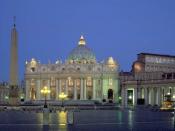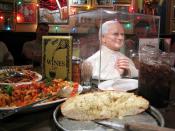Medieval times were shaped greatly by religious and secular motives to form centralized power and control. The religious leaders, in particular, were very influential in this process of centralization. The methods used to attain this power were directed at various aspects of their influence in order to realize the greatest control possible.
The concepts of power and control are difficult to define because they present themselves in a variety of different ways in a variety of contexts. The Pope had the ability to affect how people thousands of miles away thought and acted. This was an extremely powerful and unique capability. The ability to control another's actions is an invigorating and highly desirable experience for those in control.
When a person or group of people, in this case the Christian leaders, possess power and control they act to increase their power. It is often believed that things are not to remain static, either your empire grows or it declines.
If you wish to avoid the latter, you must pursue the former.
In order for a build up of central authority to occur, religious leaders knew they needed to address a variety of areas. Each of these areas represented a certain power and facet of life that was directly related to the influence of the Christian faith.
The universities deep within the Christian sphere of influence were near the heart of the religion. They represented a group of people learned in the ways of the world, more so than almost any other group of people. Having the universities under their control gave them the "scientific" backing they needed in order to be authorized to do with your empire as they saw fit. The religious leaders could do as they pleased continue efforts to increase centralization.
In his Regulations for His College,


